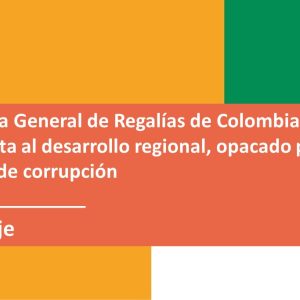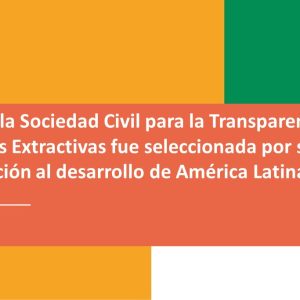Colombian organizations ask Congress to urgently ratify Escazú Agreement
Given the alarming situation of those who defend the environment in Colombia and the lack of guarantees in the protection of ecosystems, as well as the barriers that prevent effective citizen participation in environmental decision making, the Civil Society Roundtable for Transparency in the Extractive Industries
*
requests the Congress of the Republic to ratify the Regional Agreement on Access to Information, Public Participation and Access to Justice in Environmental Matters in Latin America and the Caribbean(Escazú Agreement).), doing so will be an important and positive step towards ensuring the sustainable development of the country, based on respect for the planet or the Common House, with a focus on human rights, social justice and citizen participation, as well as guaranteeing the right to life of environmental leaders.
In this sense, and as organizations that seek transparency in extractive regions, we insist on the ratification of Escazú. This treaty is a vital tool for regulating environmental rights in three main aspects: Access to Information, Citizen Participation and Access to Justice in Environmental Matters. Not ratifying it would be a sign of a Congress that lacks will and prevents the country from complying with this commitment in the framework of compliance with the protection of human rights and respect for the lives of those who protect the environment.
Since 2019, within the framework of the Great National Conversation, the Colombian government signed the Agreement before the United Nations. In 2020 it was submitted with a message of urgency by President Iván Duque, and in 2021 it was again submitted to Congress due to pressure from social and environmental groups.
However, since its filing, the bill to ratify the regional treaty has made little progress in the current Congress; only two public hearings were held in 2021. Furthermore, despite its urgency message in 2020, it did not even make it to the first debate, even though it was on the agenda of the Second Committee.
In view of these delaying actions -which show the lack of commitment before the international community- and despite the fact that there are only a few weeks left in the last legislative period of the Government of Iván Duque, the Government’s opposition managed to set the agenda for the discussion of the Escazú Agreement in the Second Committee of the Senate for April 26, 2022.
We insist on the urgency of incorporating this treaty into our legislation, a tool that we hope will allow us to work towards ceasing to be the most dangerous country in the world for environmental leaders and thereby reduce the extreme vulnerability of ecologists, indigenous peoples and environmental defenders in Colombia. As indicated by the international report of Global Witness, by 2020, 65 murders of environmental defenders were recorded and in 2021, 56 homicides have already been counted, placing us for the second consecutive year as the most dangerous country in the world for environmental leaders.
It is worth mentioning that in January 2022 the first murder of an environmental defender was a minor; a member of the indigenous reservation Las Delicias (Cauca), whose voice was extinguished. Likewise, the Investigation and Indictment Unit of the Special Jurisdiction for Peace – JEP warned in recent weeks that the department of Santander is where most threats against environmental leaders are registered.
Let this be the opportunity to request as the Civil Society Roundtable for Transparency in the Extractive Industries, that the commitment to strengthen transparency and accountability in the management of the extractive sectors through the implementation of the EITI Standard be fulfilled. The agreement was signed by Colombia in 2018 and is expected to be validated in 2022.
Finally, we recall that ratifying the Escazú Agreement brings us closer to ethical codes and consensus for the construction of the common good, and shows that Congress is on the side of the vast majority of citizens who expect greater guarantees for access to a decent life in Colombia.



